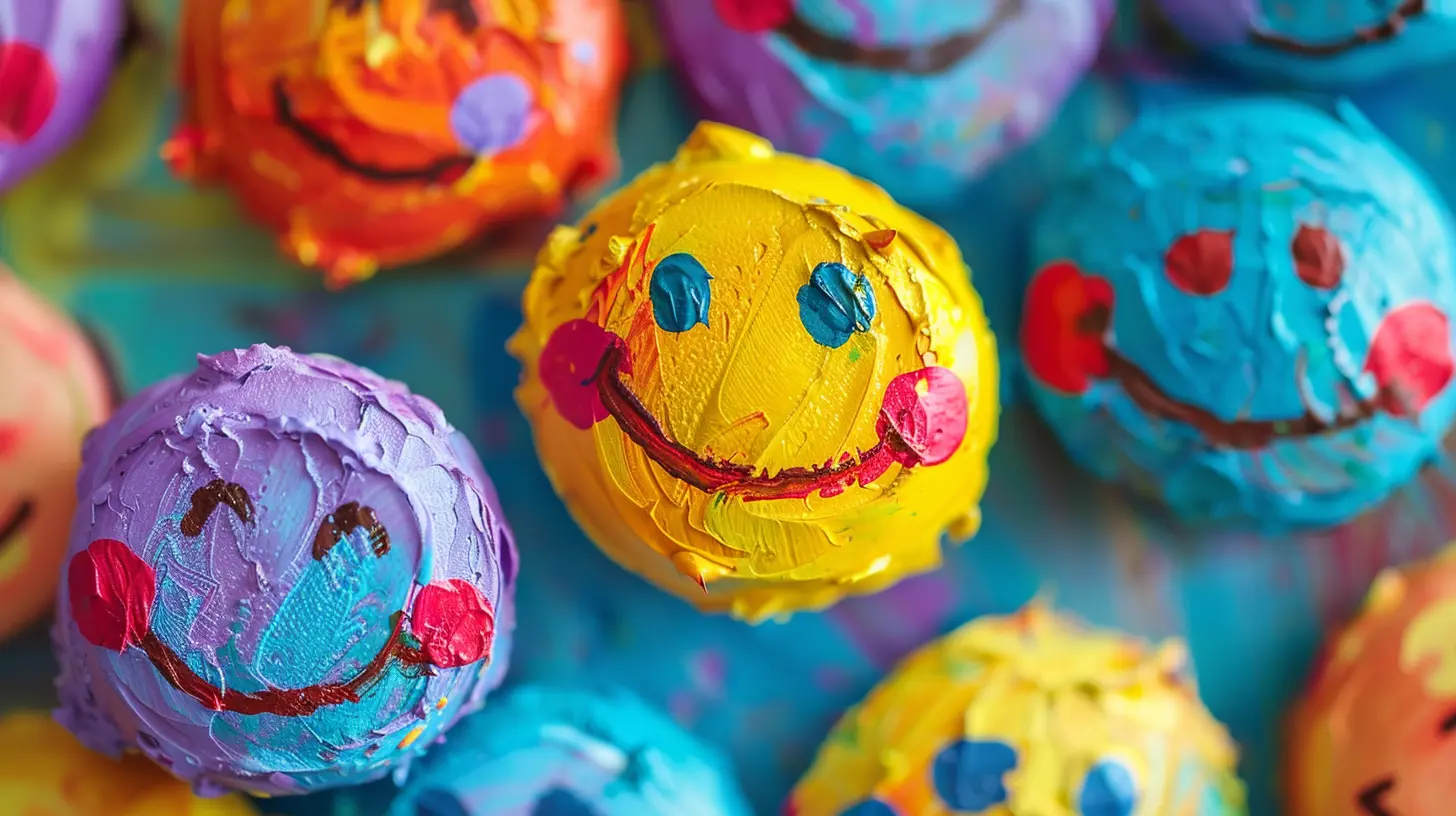The Role of Emotional Intelligence in Building Self-Esteem
29 April 2025
Self-esteem and emotional intelligence (EI) go hand in hand, like peanut butter and jelly. One simply doesn’t thrive without the other! As parents, we all want our kids to grow into confident, emotionally strong individuals who can face life’s challenges with their heads held high. But how do we help them get there?
The answer lies in fostering emotional intelligence—the ability to understand, manage, and express emotions effectively. When children develop a strong sense of EI, they naturally build self-esteem, leading to happier, more resilient lives.
So, let’s dive into the fascinating connection between emotional intelligence and self-esteem and, most importantly, how you can nurture both in your child. 
What Is Emotional Intelligence?
Think of emotional intelligence as the "EQ" (Emotional Quotient) counterpart to IQ. While IQ measures logical thinking and problem-solving abilities, EQ focuses on how well you understand and manage emotions—your own and those of others.Psychologist Daniel Goleman, who popularized the concept of EI, broke it down into five key components:
1. Self-awareness – Recognizing and understanding your emotions.
2. Self-regulation – Managing emotions in a healthy way.
3. Motivation – Using emotions to drive personal achievement.
4. Empathy – Understanding and sharing the feelings of others.
5. Social skills – Building positive relationships through emotional awareness.
Now, let’s see why this matters when it comes to self-esteem. 
Why Emotional Intelligence Is the Secret Sauce to Self-Esteem
Self-esteem is the belief in your own worth and abilities. But here’s the kicker—self-esteem isn’t just about showering kids with praise or telling them they’re "awesome" (although encouragement is great!). It’s about giving them the tools to navigate their emotions and face adversity with confidence.Think about it: A child who can recognize their emotions, regulate their frustrations, and understand others’ feelings is better equipped to handle challenges. They won’t crumble under peer pressure or feel defeated by failure. Instead, they’ll have the inner strength to keep pushing forward.
Here’s exactly how emotional intelligence builds self-esteem:
1. Self-Awareness Helps Kids Know Their Worth
Kids who understand their emotions can separate their feelings from their identity. When they make a mistake, they don’t see themselves as "bad"—they recognize they simply made an error and can learn from it. This mindset is a self-esteem booster!2. Emotional Regulation Builds Resilience
Life comes with setbacks. Whether it’s a bad grade, a lost soccer game, or a fight with a friend, emotionally intelligent kids can process their feelings without letting them define their self-worth. They learn from the experience rather than being crushed by it.3. Empathy Strengthens Relationships
Good relationships are a cornerstone of self-esteem. A child who can understand others' perspectives and emotions is more likely to form strong, healthy friendships—leading to a supportive social circle that reinforces their confidence.4. Positive Self-Talk Reduces Negative Thinking
Emotional intelligence teaches children to challenge negative thoughts. Instead of thinking, “I’m terrible at math,” they learn to reframe it as, “Math is tough for me, but with practice, I can get better.” This shift in perspective makes all the difference in their self-esteem.
How Parents Can Help Build Emotional Intelligence in Kids
Now that we know how emotional intelligence strengthens self-esteem, the big question is—how do we, as parents, nurture it? Good news: It’s easier than you think!1. Encourage Open Conversations About Emotions
Many kids struggle to express their emotions simply because they don’t have the vocabulary for it. Help them name their feelings. Instead of saying, “I feel bad,” encourage them to be more specific: “I feel frustrated because my friend ignored me.”Ask open-ended questions:
- “What made you feel happy today?”
- “What was something that upset you?”
- “How did that situation make you feel?”
This simple practice makes emotions feel normal and manageable.
2. Teach Them How to Manage Big Feelings
Emotional regulation is like having a toolbox for dealing with overwhelming feelings. Teach your child strategies such as:- Taking deep breaths when they’re upset.
- Counting to ten before reacting.
- Writing down their feelings in a journal.
- Using a "calm-down corner" when emotions get too intense.
These techniques help children learn that emotions aren’t something to suppress—they’re something to manage.
3. Model Emotional Intelligence Yourself
Kids learn best by watching us. If you handle stress with patience and express your emotions openly, they’ll pick up on those behaviors. Instead of bottling up your own frustrations, model how to deal with them:- “I’m feeling really stressed right now, so I’m going to take a few deep breaths before I respond.”
- “I was upset earlier, but I talked it out, and now I feel better.”
By doing this, you’re showing them that emotions are a normal part of life—and that they have control over how they react.
4. Praise Effort, Not Just Results
Building self-esteem isn’t about telling kids they’re "the best" at everything. It’s about reinforcing their ability to grow and improve. Instead of saying, “You’re so smart,” try:- “I love how hard you worked on that project.”
- “I’m proud of how you didn’t give up, even when it was tough.”
- “You handled that situation with your friend really well.”
Praising effort helps children focus on personal growth rather than seeking constant validation.
5. Encourage Problem-Solving
Instead of jumping in to fix every problem your child faces, guide them toward finding solutions on their own. Ask:- “What do you think would make this situation better?”
- “How can you express your feelings in a way that helps others understand?”
- “What could you try differently next time?”
This empowers kids to trust in their own ability to handle challenges, which boosts confidence tremendously. 
Final Thoughts
Emotional intelligence is the unsung hero of self-esteem. When children learn to understand, regulate, and express their emotions, they develop an unshakeable confidence that carries them through life. By fostering EI in your child, you’re setting them up for success—not just academically, but emotionally and socially, too.So, start today. Talk about feelings, model emotional intelligence yourself, and create a home environment that encourages self-awareness and empathy. The more you invest in your child’s emotional growth, the stronger their self-esteem will be.
After all, confidence isn’t about being perfect—it’s about believing in yourself, even when things don’t go as planned. And that’s a lesson every child deserves to learn.
all images in this post were generated using AI tools
Category:
Emotional IntelligenceAuthor:

Zelda Gill
Discussion
rate this article
4 comments
Ainsley Ramirez
Great insights! Emotional intelligence truly is key to nurturing healthy self-esteem in children.
May 16, 2025 at 2:24 AM

Zelda Gill
Thank you! I'm glad you found the insights valuable. Emotional intelligence is indeed crucial for fostering healthy self-esteem in children.
Xeno McVicar
Great insights! Emotional intelligence truly shapes self-esteem.
May 9, 2025 at 3:23 AM

Zelda Gill
Thank you! I'm glad you found the insights valuable. Emotional intelligence is indeed a key factor in fostering self-esteem.
Matilda Duffy
This article highlights the crucial connection between emotional intelligence and self-esteem in children. By fostering emotional awareness, parents can empower their kids to develop resilience and a more positive self-image.
May 4, 2025 at 2:32 PM

Zelda Gill
Thank you for your insightful comment! I'm glad you found the connection between emotional intelligence and self-esteem valuable. Empowering children with emotional awareness is indeed key to fostering resilience and a positive self-image.
Nixie Thornton
Absolutely loved this article! 🌟 Building self-esteem through emotional intelligence is like teaching our kids to be superheroes of their own feelings! Remember, it’s not just about raising kids; it’s about raising confident little humans who can soar! 🦸♂️🦸♀️ Keep shining!
May 4, 2025 at 4:15 AM

Zelda Gill
Thank you so much for your kind words! I'm thrilled you enjoyed the article and appreciate your insights on empowering kids through emotional intelligence! 🌟



